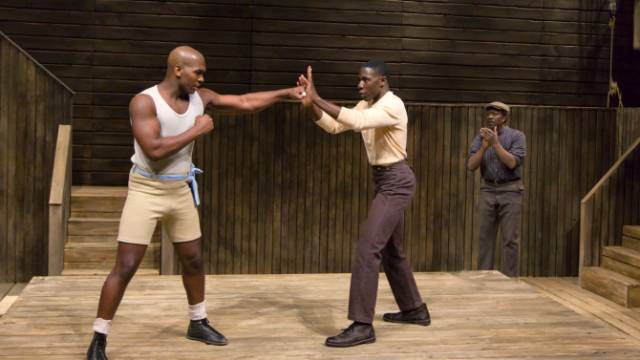

The moral dilemma at the center of Marco Ramirez’s The Royale, is the kind which makes for truly timeless theatre. Jay Jackson (Khris Davis) dreams of becoming the boxing heavyweight champion of the world, and in a way he already is, having defeated every single of his opponents. At least those he’s allowed to fight. Being a black boxer in Jim Crow era America limits his roster of opponents to those of his own race. A proud sportsman, Jay knows in his heart he will only be the true champion if he defeats the white heavyweight titleholder. Inspired by the advice of his promoter Max (John Lavelle) who tells him he will be able to secure the fight if he agrees to a ridiculous splitting of the purse, Jay sets out to train for the most important fight of his career.
What Ramirez exposes in his play though, is that beyond the romance of the sport and the ideals of winning a fair fight, the match will undoubtedly bring repercussions that go beyond Jay himself. He learns from his sister Nina (a subtly powerful Montego Glover) that violence against black people, including members of his own family, rise every time he wins a match or trespasses a “boundary”. In one of the play’s most heart wrenching scenes (done without an ounce of cheap sentiment or overt manipulation), Nina pleads with him to give up in order to save the lives of others. But what makes a man a hero, his obligation to live up to his own ideals, or his ability to put his wishes aside in order for the “greater good”? How does one even measure that “greater good” in any case?
Directed with style and efficiency by Rachel Chavkin, The Royale, is filled with tremendously powerful moments, in which the sport of boxing is highlighted both for its unique beauty and terrible violence. Even though there are no fights displayed in “real time”, through sensual choreography, and a terrific use of light and sound, we feel as if we are listening to the fights on the radio, and the scenes unfolding on the stage are but fragments of what we can envision. The Royale is also commendable for its superb performances, from Davis as the overpowering Jay, to Lavelle as the conniving, but seemingly well intentioned promoter, to Clarke Peters as Jay’s faithful trainer Wynton, who with a simple glance conveys a history of suffering and anticipated pain: he’s seen too much and knows what comes next.